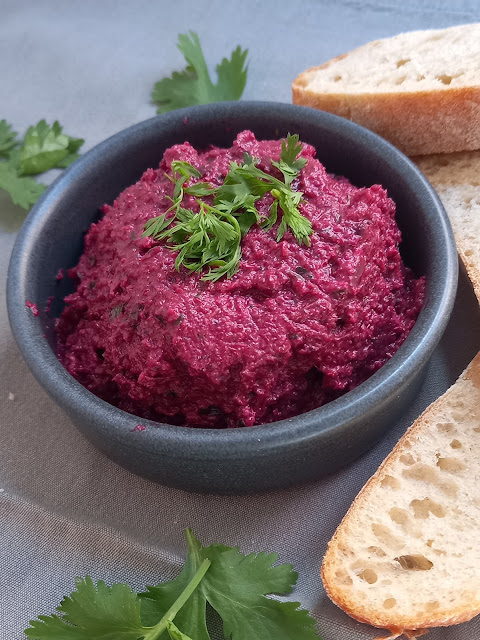What is it? Pkhali
Is it a pate, is it a paste, is it a parfait, is it a spread, is it a dip? It comes in many colours and its called pkhali.
Before I dive into these two amazing pkhali recipes, I probably need to discuss what exactly pkhali is.... Pkhali (spelt ფხალი in Georgian and sometimes transliterated to fkhali) is a type of salad or spread that is very typical to Georgian cuisine. In fact, you would be hard-pressed to find a meal table that doesn’t include pkhali as one of the many appetisers and fresh dishes on offer.The dish is made with a host of different vegetables commonly found in Georgian cuisine. Most often, you will find beet pkhali (both with beetroot and beat leaves), carrot pkhali, cabbage pkhali and aubergine pkhali. The last one, aubergine pkhali, is more often referred to as badrijani nigvzit, or aubergine with walnuts. At its heart, all pkhali is a pâté made with pureed vegetables with walnuts and spices and it is incredibly flavoursome and deeply delicious.
Pkhali (ფხალი) is what Georgians call any cooked vegetable pounded with walnuts, garlic, and spices. Some people translate pkhali as “vegetable pâté,” but I think of it as a spreadable salad. It’s pungent and colorful—fuchsia when made with beets, bright green when starring spinach. Aubergine, carrots, squash, beans, and sorrel are also common protagonists, but you can use whatever produce you have on hand, even if it’s past its prime—no one will be the wiser since it’s getting banged up anyway. You can dress pkhali up— nudge it into dainty marquises, topping each with pomegranate seeds for an eye-popping starter or vegan charcuterie board item—or just spoon it onto warm bread and eat it hunched over the sink.
However, colour and flavour are not the only differences. The consistency varies as well. It goes from a thick paste you can shape into a ball, or a bullet, to a pate-like spread. That’s why sometimes people serve them formed as individual pieces arranged on a platter, or in a more rustic way – just in a shallow bowl as I chose to do. But no matter the style or consistency, the garnish is always very traditional – coriander, pomegranate seeds, and walnut halves. Very often, the most delicious stuff doesn’t require any additional decoration.
1 1/2 cups walnut halves
2-3 cloves garlic minced
1 tablespoon red wine vinegar or to taste
small bunch coriander
small bunch parsley
salt to taste
1/2 teaspoon ground coriander
freshly ground black pepper to taste
pomegranate seeds for garnish
Put the beets in a medium-large pot fillet with water. Bring to a boil and cook the beets until tender, about 45 minutes.Alternatively you could roast them.
Remove the beets from the hot water and then let cool down for 15 minutes.
Meanwhile, in a food processor, process the coriander, parsley, walnuts, and garlic. Set aside.
When the beets are cool enough to handle peel and then grate them using a fine grater.
Mix the grated beets with the walnut paste. Season to taste with the vinegar and spices.
Refrigerate the Pkhali for at least an hour before serving. I think it’s always better the next day!
50 grams (1/3 cup) walnut halves
2 cloves garlic, roughly chopped
25 grams (1/4 cup) fresh coriander, chopped
2 teaspoons white wine vinegar
1/2 teaspoon ground coriander
1/4 teaspoon cayenne pepper
50 ml (1/4 cup) sunflower (or any other neutral) oil
Salt and pepper
Pomegranate seeds, for garnish (optional)
Before I dive into these two amazing pkhali recipes, I probably need to discuss what exactly pkhali is.... Pkhali (spelt ფხალი in Georgian and sometimes transliterated to fkhali) is a type of salad or spread that is very typical to Georgian cuisine. In fact, you would be hard-pressed to find a meal table that doesn’t include pkhali as one of the many appetisers and fresh dishes on offer.The dish is made with a host of different vegetables commonly found in Georgian cuisine. Most often, you will find beet pkhali (both with beetroot and beat leaves), carrot pkhali, cabbage pkhali and aubergine pkhali. The last one, aubergine pkhali, is more often referred to as badrijani nigvzit, or aubergine with walnuts. At its heart, all pkhali is a pâté made with pureed vegetables with walnuts and spices and it is incredibly flavoursome and deeply delicious.
Pkhali (ფხალი) is what Georgians call any cooked vegetable pounded with walnuts, garlic, and spices. Some people translate pkhali as “vegetable pâté,” but I think of it as a spreadable salad. It’s pungent and colorful—fuchsia when made with beets, bright green when starring spinach. Aubergine, carrots, squash, beans, and sorrel are also common protagonists, but you can use whatever produce you have on hand, even if it’s past its prime—no one will be the wiser since it’s getting banged up anyway. You can dress pkhali up— nudge it into dainty marquises, topping each with pomegranate seeds for an eye-popping starter or vegan charcuterie board item—or just spoon it onto warm bread and eat it hunched over the sink.
However, colour and flavour are not the only differences. The consistency varies as well. It goes from a thick paste you can shape into a ball, or a bullet, to a pate-like spread. That’s why sometimes people serve them formed as individual pieces arranged on a platter, or in a more rustic way – just in a shallow bowl as I chose to do. But no matter the style or consistency, the garnish is always very traditional – coriander, pomegranate seeds, and walnut halves. Very often, the most delicious stuff doesn’t require any additional decoration.
Beetroot Pkhali
2 medium-size beets about 1 lb total1 1/2 cups walnut halves
2-3 cloves garlic minced
1 tablespoon red wine vinegar or to taste
small bunch coriander
small bunch parsley
salt to taste
1/2 teaspoon ground coriander
freshly ground black pepper to taste
pomegranate seeds for garnish
Put the beets in a medium-large pot fillet with water. Bring to a boil and cook the beets until tender, about 45 minutes.Alternatively you could roast them.
Remove the beets from the hot water and then let cool down for 15 minutes.
Meanwhile, in a food processor, process the coriander, parsley, walnuts, and garlic. Set aside.
When the beets are cool enough to handle peel and then grate them using a fine grater.
Mix the grated beets with the walnut paste. Season to taste with the vinegar and spices.
Refrigerate the Pkhali for at least an hour before serving. I think it’s always better the next day!
Spinach Pkhali
300 grams (10 cups) fresh spinach50 grams (1/3 cup) walnut halves
2 cloves garlic, roughly chopped
25 grams (1/4 cup) fresh coriander, chopped
2 teaspoons white wine vinegar
1/2 teaspoon ground coriander
1/4 teaspoon cayenne pepper
50 ml (1/4 cup) sunflower (or any other neutral) oil
Salt and pepper
Pomegranate seeds, for garnish (optional)
Bring a large pot of water to a boil over high heat. Add spinach, stir and cook for one minute. Drain in a colander, pressing on the spinach with the back of a spoon to release as much moisture as possible. Set aside.
In the bowl of a food processor, pulse the walnuts and garlic until ground fine and the consistency resembles wet sand.
Scrape down sides of bowl and add the spinach and coriander. Pulse until well-combined and homogenous.
Transfer contents to a large mixing bowl and add vinegar, coriander, cayenne and oil, stir to combine. Add salt and pepper to taste. Cover with plastic wrap and refrigerate mixture until it is firm, about one hour.
With clean hands, shape the pkhali into small balls, 4-6 in total depending on the size you prefer. Garnish with pomegranate seeds, serve and enjoy!
In the bowl of a food processor, pulse the walnuts and garlic until ground fine and the consistency resembles wet sand.
Scrape down sides of bowl and add the spinach and coriander. Pulse until well-combined and homogenous.
Transfer contents to a large mixing bowl and add vinegar, coriander, cayenne and oil, stir to combine. Add salt and pepper to taste. Cover with plastic wrap and refrigerate mixture until it is firm, about one hour.
With clean hands, shape the pkhali into small balls, 4-6 in total depending on the size you prefer. Garnish with pomegranate seeds, serve and enjoy!






Comments
Post a Comment